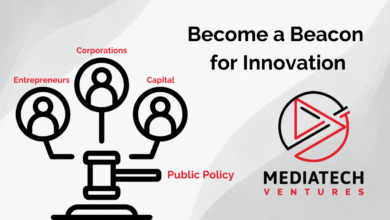
There are few industries in the world in which public and private interests align as much as they do when it comes to our creators. It’s in and through media, that the arts, entertainment, and communication converge, painting a picture for all industries of what it might look like to fully realize what many today aspire to, in rethinking the role of capital in our communities of entrepreneurs.
“Social impact investing, which combines the tech/ Venture Capital (VC) startup funding model with the need to deliver against social goals – could be a way to address structural challenges and increase the number of truly innovative projects out there.”
– Jakub Parusinksi; The Fix – Early 2020
In a wonderful perspective, just as the world quieted for quarantine, media industry journalist, Jakub Parusinksi noted, “Time to rethink the media funding model,” exploring a motif increasingly common in startup circles – that Venture Capital’s typical model fails to meet the needs of the economy and it’s time for that to change.
How does the media industry lead the way? In appreciating how the arts, entertainment, and communications, converge in our space, directly or indirectly thanks to Public-Private Partnerships; agreements between private entities like companies, and government organizations, so that they can together meet the varied needs of a public interest. We see that very thing in the potential of a City’s Arts Commission, Government’s Economic Development interests, a Media Foundation’s support, and a Company, providing the infrastructure, platform, or resources, working in concert to realize the impact of culture in your community.
Parusinksi notes of social impact investing, “baking in social objectives, this form of investing can tilt the balance towards companies with an actual mission, rather than those just looking out for their bottom line,” and while he’s exploring what many today are, how to account for that social impact through venture capital, I can’t help but keep hearing the drumbeat of how the media often unintentionally works but should work together to accomplish this – with the public interest on social impact as is done in the arts, culture, or economic development, supporting private sector innovation and projects that change the economy for the creative class.
Public-Private Partnership
Collaboration between a government agency and a private-sector company that can be used to finance, build, and operate projects.
Private-sector innovation, for example, helps improve the operational efficiency of public services while the public sector provides incentives for the private sector to deliver projects otherwise out of scope or resources.
At the center of this potential in creative entrepreneurship is a discussion being had, Saturday August 14th
A Virtual Conference to Reframe the Creative Industries
It’s well past time that we empower creatives and entrepreneurs, at all levels, with the knowledge, skills, and relationships necessary to rethink our future in media and to help everyone find business. This is the mission of a pilot project, fiscally sponsored by Arts Alliance Illinois and funded by the Coleman Foundation. 2112, Chicago’s first business incubator serves as programmatic lead while we, through MediaTech Ventures, as well as partner organizations in each focus industry (Music, Film/Video, Dance, Theater, Fashion, Visual Arts/Design, Media, Sports, Culinary), work with these parties to reframe business, innovation, and the arts, through Illinois in the United States.
A Public-Private Partnership that fuels greater value for private investors while meeting the needs and objectives of the community at large.
Center for Creative Entrepreneurship
CCE commits to helping expand the talent pipeline within the creative sector through advanced professional development, job and entrepreneurship training, relationship building, and access to capital for individuals, creative businesses, institutions, and community organizations. CCE maintains a focus on equity, ensuring its programs engage communities of color, LGBTQ, veterans, and other historically marginalized communities for creative workforce. To accomplish this, we partner with established community based organizations and workforce development agencies that intentionally serve, prepare, place, and support job-seekers from disinvested communities.
Cultivating community in the creative industries through storytelling, networking, showcases, demos and awesome people, on August 14th, the Center for Creative Entrepreneurship (CCE), hosts Israel Idonije – FBRK, Eric Williams – The Silver Room, Priya Shah – The Simple Good, Eric Sheinkop – The Desire Company, Matt Matros – Shopflix, Suzanne Jurva – 371 Productions, and Norm Winer – Noteworthy, with performances by Mandala Arts, Pinqy Ring, and Greg Spero, for Ted Talk style presentations, demos of up and coming businesses, and exhibitions to strengthen ties within the industry and inspires an innovative and collaborative creative sector.
Whether an artist, an entrepreneur, those investors, or the hearts working passionately to serve the public interests and impact we can all have, [join us].

To learn more about the Arts Alliance Illinois, Coleman Foundation, 2112, or our work, join us [here] or through their respective websites. To talk more about the changing role of capital and to start investing in what makes a difference in our economy and for creators and entrepreneurs, [get in touch with us].







